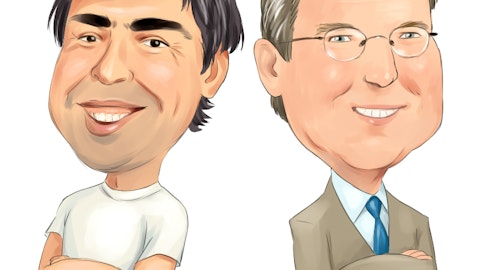If there’s one company that will either go public or get taken over in 2013, its pinboard-style social media site Pinterest. In the three short years since it was founded, Pinterest has become the sixth most visited social media site in the United States with 272 million unique visitors in 2012. According to Reuters and comScore, the site has 48.7 million active users. Its endlessly scrolling pinboard style – which allows users to pin any image from the web to add to their personal collections of food, books, movies, apparel, travel destinations, and more – has proven to be an incredibly popular format, with sites like eBay also cloning its design aesthetics.

A recent round of funding now gives the company an estimated market value of $2.5 billion. That means that the little startup is quickly rising in value, and I believe that three companies in particular – Amazon.com, Inc. (NASDAQ:AMZN), Facebook Inc (NASDAQ:FB) and Google Inc (NASDAQ:GOOG) – would benefit the most from adding Pinterest to their portfolios.
Pinning Pinterest’s Popularity
According to Nielsen’s 2012 Social Media report, Pinterest is the fastest growing social media network in the United States, growing its visitor base 1,047% year-on-year. At this rate, it will soon pass LinkedIn Corp (NYSE:LNKD) and WordPress and close in on the ‘big three’ of social media – Facebook Inc (NASDAQ:FB), Blogger and Twitter. What’s more, Facebook and Blogger’s unique visitors are declining.
Source:
http://marketingland.com
Pinterest also posted the highest mobile growth of its social peers, with mobile app usage rising 1,698% and visits to its mobile website surging 4,225% year-on-year. By comparison, the second fastest growing mobile app was Twitter, with 134% growth, and the second fastest growing mobile website was Reddit, which grew 153%.
The majority of Pinterest’s user base is female, in two primary age segments: 25-34 year olds, who access the site from mobile device more often, and 35-49 year olds, who use its desktop website more frequently. Females account for 70% of Pinterest’s desktop users, 72% of its mobile site users and 84% of its mobile app users.
Pinterest ranked fourth as the mobile app with the longest per-visit engagement rate. Users spent an average of 14.1 minutes on the site per visit in 2012.
Pinterest’s whopping growth figures certainly look impressive, but what could tech giants Amazon, Facebook Inc (NASDAQ:FB) or Google gain from acquiring Pinterest?
Amazon
As much as I love Amazon, its main website is looking increasingly cluttered and dated. Ever since eBay Inc (NASDAQ:EBAY) adopted the Pinterest-style scrolling pinboard, I’ve wondered why Amazon hasn’t done the same for its main page.
Pinterest users often pin ‘wish lists’ of things they wish they could buy – a perfect fit (and more attractive alternative) to Amazon’s own Wish Lists. Combining Pinterest with Amazon Wish Lists could yield some interesting results, such as personalized gift lists for friends.
Yet Amazon would benefit even more if it kept Pinterest as an independent site, and linked pinned items back to Amazon.com. To encourage this, Amazon could convert Pinterest users into affiliates, paying them to drive traffic to its site with their collections. If executed properly, Amazon could create a self-sustaining ecosystem of users profiting from advertising their wish lists to other users, while driving traffic and sales to Amazon. This would be a win-win situation for both Pinterest users and Amazon investors.
Amazon would inevitably collect stats from Pinterest users to gain some valuable data on consumer behavior, which could cut research and development expenses considerably when crafting new marketing initiatives. Lastly, Pinterest’s site is already located on Amazon’s servers, which would make the migration and integration of its users fairly painless.
Pinterest would be a beautiful fit for Facebook Inc (NASDAQ:FB) as well. Just as Facebook tapped into the need for humans to constantly share and be acknowledged, Pinterest channels the need to collect, hoard and share – a perfect horizontal acquisition.

